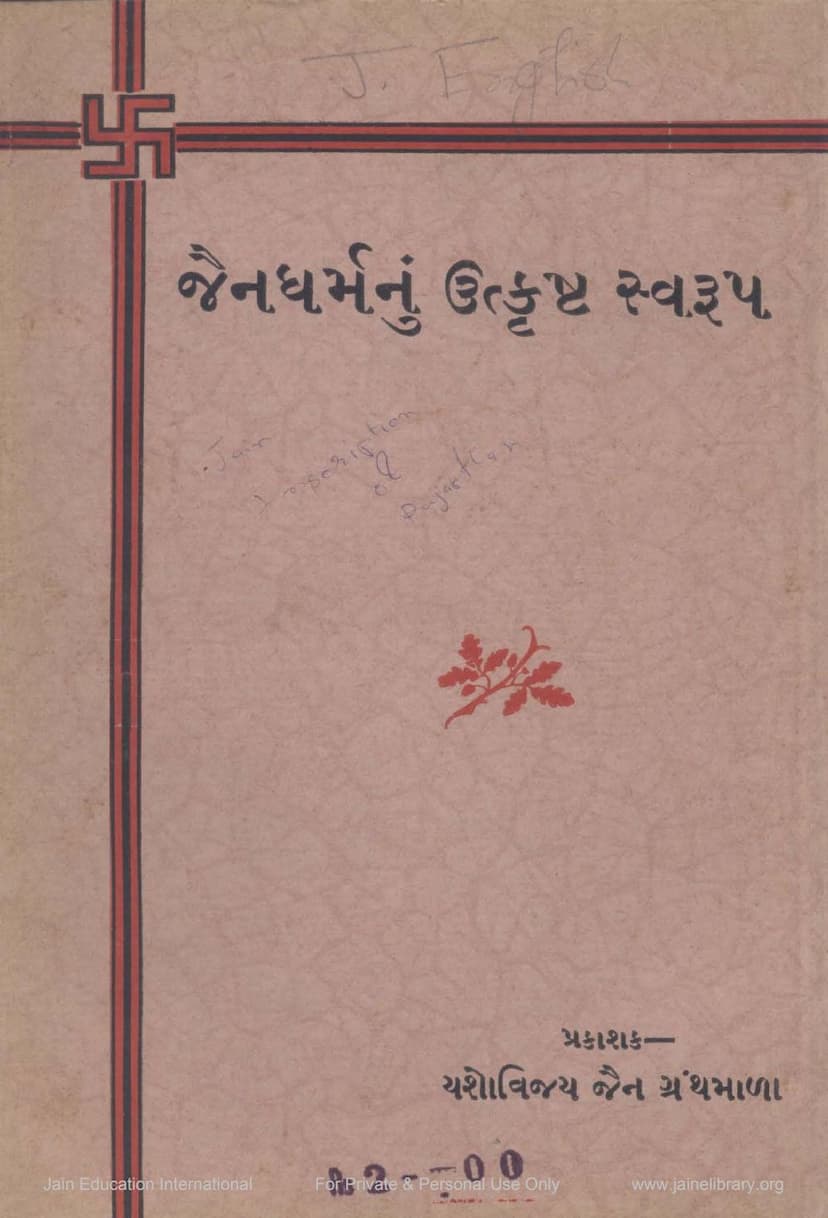Jain Dharm Nu Utkrushta Swarup
Added to library: September 2, 2025

Summary
Here's a comprehensive summary of the Jain text "Jain Dharm nu Utkrushta Swarup" (The Exalted Form of Jainism), based on the provided pages:
Overall Purpose and Context:
The book, published by Yashovijay Jain Granthmala in 1938, focuses on presenting the "Exalted Form of Jainism" through the comparative thought of Acharya Shri Vijayadharmasuri. It primarily features a significant letter written by Acharya Vijayadharmasuri to Professor Herman Jacobi, a renowned Oriental scholar, discussing the superiority and ancient nature of Jainism. The text also includes Jacobi's responses, offering a European perspective on Jain principles like Ahimsa (non-violence) and vegetarianism.
Key Themes and Arguments:
-
The Superiority and Antiquity of Jainism:
- Acharya Vijayadharmasuri argues that Jainism is the oldest religion of India, with traditions and principles that predate Vedic traditions.
- He asserts that Jainism's teachings have been consistent throughout history, with all Tirthankaras imparting the same fundamental truths.
- He contends that many concepts, stories, and even festivals found in other Indian religions (Hinduism, Buddhism) have their origins in Jainism, often in a simpler, unadulterated form.
- The book highlights Jainism's philosophical depth, mentioning concepts like Syadvada (the doctrine of conditioned predication) and atomic theory, which have influenced other Indian philosophical schools.
-
Ahimsa (Non-Violence) and Vegetarianism:
- A central discussion revolves around Ahimsa, particularly its implication in dietary choices.
- Acharya Vijayadharmasuri strongly advocates for vegetarianism, explaining its scientific and spiritual benefits. He debunks the idea that climate dictates the need for animal food.
- He argues that the destruction of animals for food is inherently sinful, and even the consumption of vegetables involves the destruction of one-sensed beings (ekendriya jivas), but the degree of sin is vastly different.
- He emphasizes that Jain discipline, especially for monks (Sadhus), is rigorous, aiming for the conquest of the self, which naturally leads to a vegetarian diet.
- Professor Jacobi, while appreciating the Jain perspective, presents the European viewpoint. He explains that in Europe's climate and lifestyle, Ahimsa is interpreted as kindness to animals and avoidance of needless suffering, rather than a strict adherence to vegetarianism. He also points out the unavoidable destruction of insect life during agriculture and the practical challenges in certain climates.
-
Critique of Buddhism and Other Religions:
- The text analyzes the decline of Buddhism in India, attributing it to a lack of discipline and the admission of nominal converts, which diluted its core principles.
- Acharya Vijayadharmasuri suggests that many aspects of Hinduism have borrowed from or been influenced by Jainism, sometimes in a modified or diluted form. He criticizes the permissiveness regarding animal sacrifice in certain Vedic rituals as an attempt to appease the masses.
-
The Nature of Jainism:
- Jainism is presented as a religion of strict discipline, self-control, and moral courage.
- The term "Jina" means "conqueror," signifying the ability to overcome one's own senses and desires.
- The pursuit of spiritual perfection, liberation from karma (Karmabandha), and the attainment of Moksha are highlighted as the ultimate goals.
- The book underscores the meticulousness of Jain practices, such as the careful boiling of water to minimize harm to microscopic beings.
-
The Role of Acharya Vijayadharmasuri:
- The "Kinchit Vaktavya" (A Little Statement) section praises Acharya Vijayadharmasuri as a profound thinker, scholar, and saint who dedicated his life to religious and literary service.
- His extensive correspondence, particularly his letters to scholars like Prof. Jacobi, is recognized as a significant contribution to propagating Jainism globally.
- The publication of his letters is seen as an effort to honor his legacy and spread his profound insights.
-
Professor Herman Jacobi's Perspective:
- Jacobi acknowledges the self-consistency of Jain theories on Karma and Jiva.
- He explains the European understanding of Ahimsa as kindness and avoidance of cruelty.
- He argues for the necessity of considering different climatic and cultural conditions when comparing moral ideals.
- He notes that while Europeans share common moral principles with Jains, their focus is often on active participation in life and self-improvement rather than strict abstention.
- Jacobi expresses interest in publishing portions of Acharya Vijayadharmasuri's letters to promote Jainism in Europe.
In Essence:
"Jain Dharm nu Utkrushta Swarup" serves as a testament to the enduring and profound nature of Jainism, as articulated by Acharya Vijayadharmasuri. Through a scholarly exchange with Professor Herman Jacobi, the book highlights Jainism's claim to antiquity, its philosophical depth, and its emphasis on non-violence and ethical living. It showcases how Jain principles, particularly Ahimsa and vegetarianism, are viewed and practiced differently across cultures, while affirming the universal applicability of ethical conduct and spiritual striving. The work is presented as a tribute to Acharya Vijayadharmasuri's dedication to spreading the true essence of Jainism.